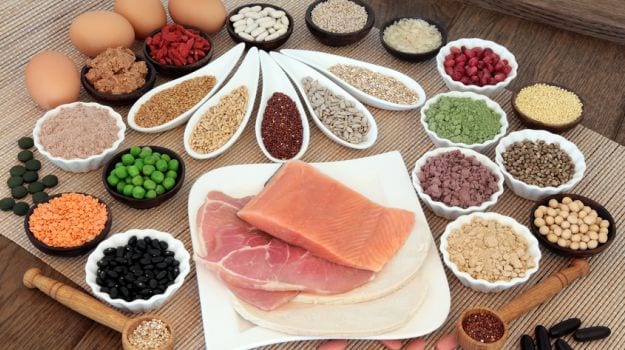How Much Protein Do We Need In a Day?
According to Health Practitioner and Macrobiotic Nutritionist Shilpa Arora, "46 grams for an average woman and 56 grams for an average man, is considered to be an ideal amount. The protein requirement may change if you happen to be an athlete or are required to lead a very active and fit lifestyle."
What Does Excess Protein Do?
Shilpa explains the possible adverse effects of consuming too much protein, " Excessive Proteins leads to an acidic body increasing the amount of uric acid which then leads to a host of diseases like gout, asthelerosis, kidney stones, dehydration, weight gain, and inflammation in the body." Here are some ways in which excess intake proteins can affect us.
1.Might Affect Your KidneysWith an increased intake of proteins, you also take in a fair amount of nitrogen, a substance naturally occurring in the amino acids that form proteins. When you consume a lot of protein, your kidneys have to work harder to get rid of all the extra nitrogen which may result in kidney damage in the long run.

The excess nitrogen from the protein can take a toll on your kidneys
2. May Make You Feel Parched and Thirsty Often The excess nitrogen excreted during the digestion of amino acids can leave you feeling parched and thirsty. This is because high amounts of nitrogen are considered toxic by your body, so to mellow its effects, the body uses more fluids and water to flush it out as a defence mechanism, which makes you feel thirsty.

The excess Nitrogen may also make you feel thirsty
3. May Cause Nausea
With excessive protein intake, your body finds it hard to break down your digestive enzymes, which can lead to nausea, indigestion and an upset stomach.4.Might Just Add To Weight Gain, Instead of Cutting It DownYes, all proteins and no (complex) carbohydrates can do more harm than good for weight loss. When you take more proteins than what your body needs or can handle, the extra protein might be stored as fat, while the excess amino acids on the other hand will simply be excreted, leading to flabs around the tummy and thighs.

Excess protein can add to extra flab
5.Mood SwingsOften in a high protein diet, you tend to rule out carbs which is perhaps the biggest mistake you make. Your brain likes carbs. Carbohydrates, sugar and starch are essential for fuelling the brain to run properly. They also stimulate the production of serotonin- the mood regulating hormone. The more you deprive your brain of carbs, the higher are your chances of being moody.

Excess protein and less of carbs can result in mood swings
6.Problems With Digestion Replacing a significant part of your diet with protein, may make you lose out on essential fibres you get from various grains and vegetables . Fiber is important for smooth digestion. Without enough fibre you may experience digestive problems and constipation.

Excess protein and less of fibre intake can cause problems in digestion
The key to a healthy and fit body is a balanced diet, and every nutrient has its own role to play in the process. Shilpa Arora shares, "Anything is excess is bad, the same is the case with proteins. Moderation is the key to a healthy lifestyle. Our bodies require a certain amount of nutrients to be healthy. Anything in excess will definitely invite problems. Today, we are seeing a surge in diseases not just because of nutrient deficiencies but also excess consumption."
About Sushmita SenguptaSharing a strong penchant for food, Sushmita loves all things good, cheesy and greasy. Her other favourite pastime activities other than discussing food includes, reading, watching movies and binge-watching TV shows.





